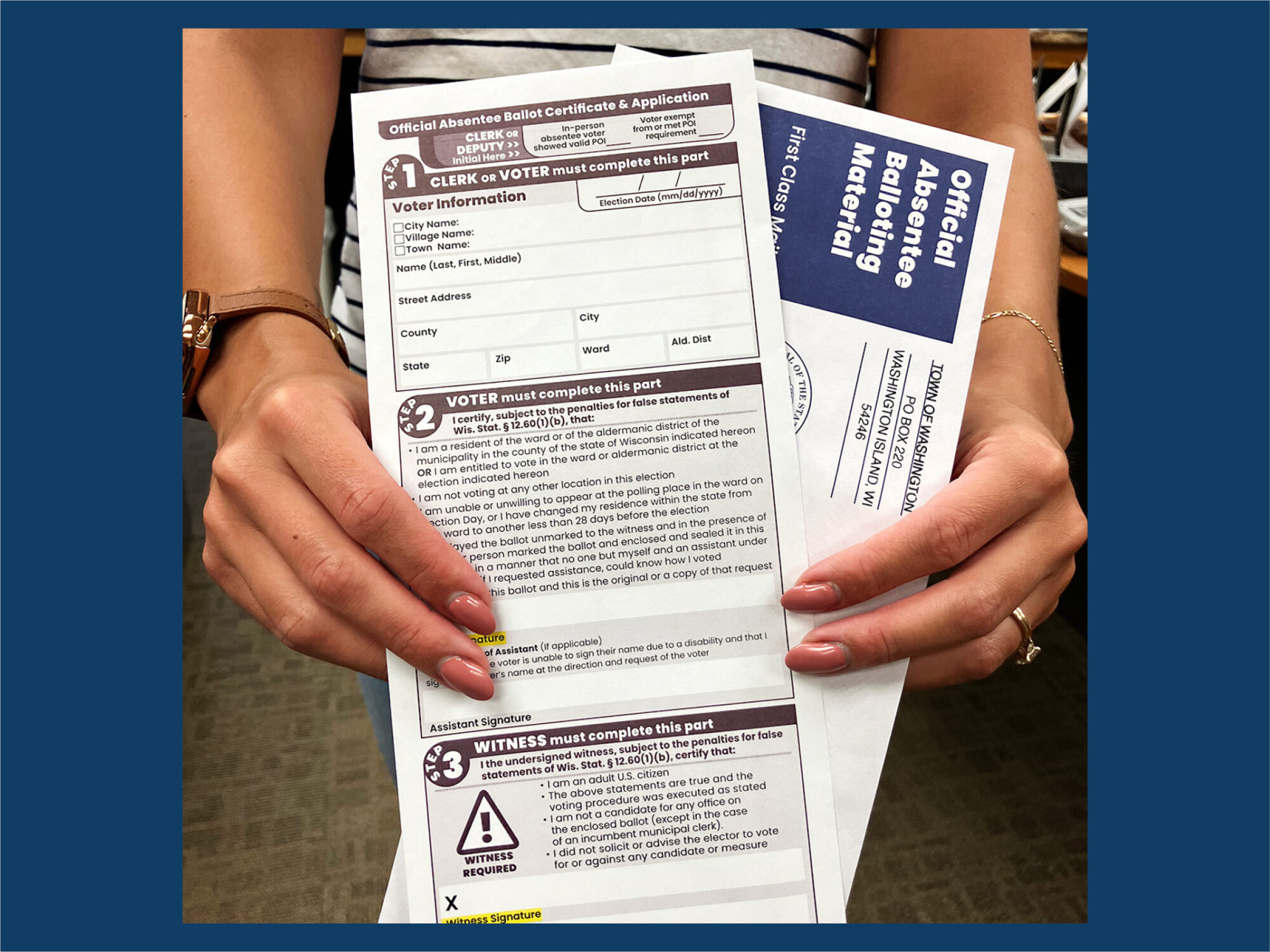
This article is part of U.S. Democracy Day, a nationwide collaborative on Sept. 15, the International Day of Democracy, in which news organizations cover how democracy works and the threats it faces. To learn more, visit usdemocracyday.org.
Four years after former President Donald Trump falsely claimed the election was stolen after he lost, Wisconsin voters head to the polls this November to make their choice in another contentious presidential race, as well as several local and state races.
Clerks and election officials face some specific challenges ahead of Nov. 5, but local election processes and infrastructure should inspire confidence in local voters, according to Door County Clerk Jill Lau.
In 2020, Wisconsin and a handful of other states were at the center of Trump’s stolen election claims. In 2016, Trump won Wisconsin, and in 2020 he lost the state to President Joe Biden by roughly 21,000 votes. Following the election and an attack on the Capitol on Jan. 6, a series of challenges and suits were brought forward by Trump and his supporters. Some of those continue to this day.
Roles and funds
Every state in the union administers elections according to their own laws. Some, like Wisconsin, leave it up to the municipal and county clerks to run elections, and some states have an elections commission that comes in and manages the polls.
Wisconsin has an elections commission, but municipal clerks run election day, and the county clerk acts as the chief election official of the whole county, Lau explained. The county is responsible for providing supplies, ballots, and voting machine programming.
If there is a school district or municipal election, those candidates must register and return paperwork to the municipal clerk’s office. Then the municipal clerk sends that information to the county clerk’s office.
County candidates must file their paperwork with county clerks, and county, state and federal races are the responsibility of the county clerk. They put all the races together on the ballot, including referendums and ballot questions, and send it to printers.
The county and municipal budgets fund elections in Door County, Lau said. Municipalities are responsible for paying for poll workers, election day costs and maintenance of equipment. The county pays for the principal lists of voters, forms needed at the polls and ballot printing, unless there are school district and/or municipal races on the ballot. In that case, the county and municipality split the costs.
In April, voters approved a state constitutional amendment to no longer allow private money to pay for anything related to elections. But Lau said that won’t affect Door County because no grants or outside money has funded any of Door County’s voting infrastructure in the time she has been county clerk. Lau has served as county clerk for 18 years and was the clerk for the Town of Nasewaupee from 2001 to 2006.
Challenges
Lau has had challenges during her tenure as county clerk. After the 2020 election, she was the target of a lawsuit. Pete Bernegger, a New London resident behind the suit, was working with a group of citizens to independently investigate and audit the 2020 elections. The lawsuit was in pursuit of records that would show it was a “wrongful election,” Lau said, and one of many directed at various clerks around Wisconsin.
The lawsuit was eventually dismissed, and Bernegger assessed $632.00 in legal fees by the county. Door County did hire a law firm to defend the county’s election integrity in the suit, according to a report by Joan Korb that appeared in an Oct 29, 2021 issue of the Peninsula Pulse newspaper. Korb is a former Door County district attorney and assistant district attorney who provides legal reporting for the Pulse.
There is usually a reasonable explanation when there are discrepancies, Lau said, and it usually amounts to human error. That is regrettable, but a reality, she said, and election workers rely on checks and balances built into the system to prevent as many errors as possible.
Independent election auditors like Bernegger challenged a number of things attempting to prove election fraud in 2020, including the validity of absentee ballots, and whether undocumented immigrants, deceased persons, convicted felons and other ineligible voters are voting, or registered voters are voting more than once. Lau said these challenges are, for the most part, baseless, and there is no election fraud happening in Door County.
“There isn’t anything we can do to change some people’s minds, so I focus on providing truthful and accurate info and doing my best,” Lau said. “I’m not here to cover things up—there are so many checks and balances, some of this (election fraud) stuff literally can’t even happen.”
“At least not here in Door County,” she added, indicating the commitment and experience of local officials.
Lawsuits, challenges and extensive open records requests not only create a “time-suck,” according to Alex McDonald, the clerk/treasurer for Washington Island, but they undermine voter confidence and create tension at the polls.
McDonald invites anyone who is distrustful of the voting process to be poll workers. “Once they see all the pieces, how much process there is, they will leave more confident in elections,” she said.
In the state of Wisconsin, county and municipal clerks are largely responsible for administering elections, and they are under the microscope. The number of election integrity groups and individual citizens who style themselves as election auditors has grown since 2020 and McDonald and Lau both stated their offices have received significantly more open records requests than usual pertaining to the 2020 election. Registration data, ballots, envelopes, poll day documents: the list goes on, according to McDonald.
For example, Bernegger’s suit requested, among other things, “every single official voting machine printout from every tabulator” used in November 2020’s election.
That continues today as well, McDonald said, and she directs such requests to Badger Voters first. Badger Voters is the Wisconsin Elections Commission online voter records request site. As much as these requests take time away from her other duties, however, McDonald sees an upshot.
“It made me aware of how important documentation and the rules are,” she said.
It has also made her more cautious, she said, and the threat of intense scrutiny factored into some of her decisions this year, specifically regarding drop boxes. Washington Island will not use a drop box this election.
“That’s hard for me,” McDonald said. “It’s good to have that access (for absentee voters)…but there isn’t clear direction on security. It’s the logistical stuff. I’d rather, if I’m getting audited on this election, I can check ‘no’ on that box (that asks if the municipality used dropboxes).”
While conspiracy theories and large-scale records requests work to undermine voter confidence at the polls, according to local clerks, voters are encouraged and invited to attend public voting machine testing and ask questions. All municipalities are required to perform a public test of their voting equipment a week before the election and those meetings are publicly posted.
Mail concerns
Concern about mail delivery related to absentee ballots was expressed by the five Door County clerks interviewed. Their concerns echo those of state and local election officials nationwide. On Sept. 11, the National Association of State Election Directors, the National Association of Secretaries of State, and the presidents of 29 local election official associations sent a joint letter to U.S. Postal Service Postmaster Louis DeJoy regarding concerns about election mail service.
“Over the course of the last year, election officials across the country have raised serious questions about processing facility operations, lost or delayed election mail, and front-line training deficiencies impacting USPS’s ability to deliver election mail in a timely and accurate manner,” the letter states.
Social media posts on the Washington Island Virtual Bulletin Board Facebook site announced delayed mail delivery once a week on average throughout the summer. Local lawmakers got involved in December 2023 and January 2024 after mail delays in Sturgeon Bay came to light.
Local USPS officials did not respond to requests for comment by the time of publication.
A day or two of turnaround in the mail is just not happening anymore, Lau said. Sometimes things take upwards of a week to get where they need to go, even when they are within the same municipality, she said.
“It’s a concern,” Village of Sister Bay Clerk Heidi Teich said.
“Yes, I’m worried about the mail,” McDonald said. “Mail is regularly delayed up here.”
Lau recommended voters be proactive to avoid problems caused by mail delay. “Request your ballot early and vote your ballot as soon as you get it,” she said.
A handy tool she recommended is available at www.myvote.wi.gov, the Wisconsin Elections Commission site where you can find out all things about Wisconsin voting. Not only can voters register to vote, see what’s on the ballot, find their polling place and sign up to vote absentee, but they can track their absentee ballot.
Clerks receive absentee ballots, check the envelope to make sure everything necessary is there, log them online, and then put them away securely until election day, she said, unless something is wrong with the address, signature, or witness address or signature.
If a voter has sent their absentee ballot in and there is something besides “completed” at the last step of the process online, that’s your clue to reach out to your clerk,” Lau said.
Rejection rates for absentee ballots are very low in Door County, according to Lau. Often, if time allows, clerks will try to contact an absentee voter when their ballot envelope has mistakes, but they are not responsible for telling voters they did something wrong.
“The voter who is choosing to vote absentee, that is their responsibility,” Lau said. “Clerks will do our best; we want every voter counted.”
Election workers
Nationally, poll workers and election officials are in shorter supply. High turnover after the 2020 election, aging out of the job, and Covid pressures have led to some shortages among this group, Lau said.
But Door County is “sitting okay” when it comes to poll workers, she said.
The political atmosphere since 2020 has caused some people to be afraid to work, according to Lau, and while most are not directly threatened, it’s a fearful climate they are working in.
“They’re afraid of what might happen,” she said.
McDonald said at least one of the poll workers on Washington Island quit due to mistreatment by a voter since 2020, but most of her poll workers feel what they are doing is valuable and are fulfilled by it.
“Elections are such a keystone, integral part of democracy,” McDonald said., “I’m fortunate to be a full-time clerk who is afforded training. There are some places that have a part-time clerk working out of their home, and it is a huge, monumental task administering elections.”
At least one municipality in Door County is struggling to find workers to perform that task.
In the Town of Nasewaupee, the clerk position is vacant and Lau is serving as interim clerk there. There was only one chief election inspector going into this election cycle, Lau said, and that person quit recently.
“They were overwhelmed,” she said. “Elections always seem to be changing, it’s an ever-evolving and moving target, so they stepped down.”
Lau sent out 50 letters looking for a new chief election inspector for the town, but only received one commitment. The amount of training and responsibility for that position was too much for most respondents, she said.
Confidence and trust
One thing local election workers and voters do not have to worry about is the security of voting equipment used in Door County municipalities, according to data provided by Verified Voting. The organization is a nonprofit that provides information and resources about election technology “to strengthen democracy for all voters by promoting the responsible use of technology in elections,” according to its website.
Data from 2012 to 2024 shows the in-person voting equipment used in Door County has the highest level of security classification, a 6 on a 1 to 6 scale, with 6 being the highest rating. The classifications are designated by Verified Voting’s categories, which focus on the reliability of equipment and verification records.
Dominion ImageCast Evolution hybrid optical scanner machines are the type used in all of Door County now. With this device, most voters will mark their ballots by hand after receiving them from the polling place check-in station and hand-feed their ballot into the machine. The machine scans paper ballots, interprets the marks and communicates any issues to the voter via the screen. There are also options for voters with disabilities.
Hand-marked paper ballots, or ballots marked with an assistive device for those who need them, that are verified by the voter before casting are considered the most secure by election security experts.
In 2015, all Door County municipalities upgraded their voting equipment, Lau said. They had all been using electronic voting systems since the 90’s, but it was time to look at better technology.
The type of voting equipment a municipality uses is up to the municipality, she said, and Door County clerks are all on the same page.
Clerks got together and discussed all the options, she said, and the consistency of everyone using the same machines means if a clerk is new and has questions, or if the machine is not working properly, election workers can rely on neighboring municipalities for troubleshooting and assistance.
Even though municipalities are responsible for purchasing voting equipment, the county bought the new machines in 2015 and gifted them to the 19 municipalities, Lau said.
Accessibility can be an issue for voters, and while voting absentee is an option, there are also special election deputies that bring ballots to retirement and assisted living communities in Door County, according to Teich. Sister Bay and Sturgeon Bay both provide this service.
At least one Door County municipality provides curbside voting as well. The Village of Ephraim will send two poll workers out to a voter’s car if they are ill or have difficulty with mobility, according to Village Clerk Andrea Collak. She encouraged voters to contact their municipality directly to see if they offer that service.
In fact, voters should contact their municipal clerk for any questions about voting, Lau said. The county office will answer questions also, but the majority of voter information and communication occurs at the municipal level, she said.
This is a very busy time for clerks. Lau said there is not a day that goes by without something election-related to be done, but part of that is voter education.
She has some advice for voters in these next weeks leading up to the Nov. 5 election, most of it highlighting voter responsibility:
- Vote in-person if you can
- Be patient
- Bring your correct photo ID if registered
- Bring the photo ID and additional correct documents if you’re not registered and intend to register on the day of
- If you can register ahead of time, please do. Registering day of can create longer wait times.
- If you’re absentee, get your ballot sent as soon as possible and track its status
- Be prepared as a voter. Pay attention to dates and deadlines. Know your candidates.
- Know your rights.
Dates to know for the 2024 elections in Door County
As the 2024 elections on Nov. 5 approach, Door County Knock has compiled dates to remember for the voting process, as well as voter education and voter registration events. Click here for more information.

